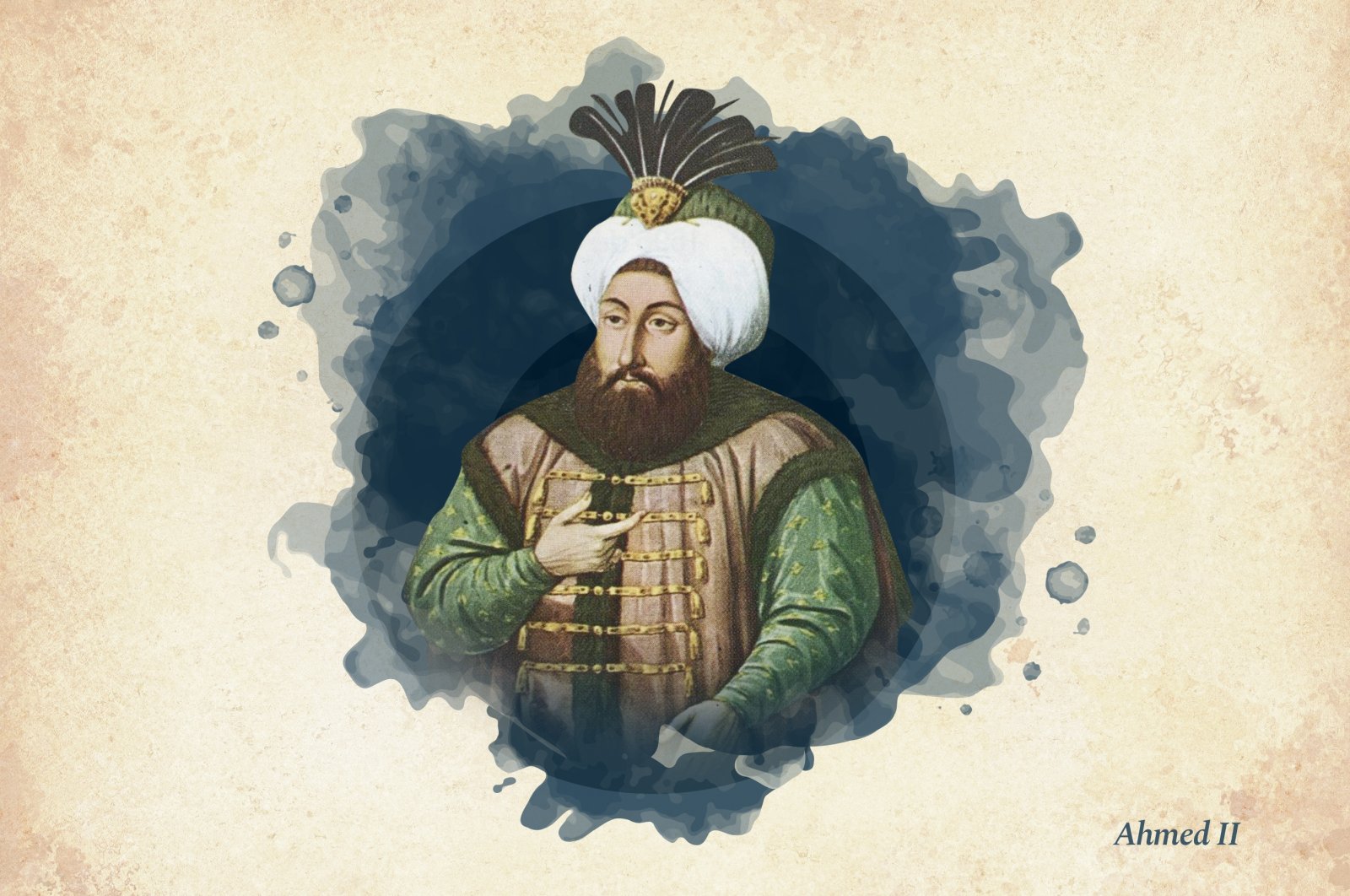
MIGHTY SOVEREIGNS of OTTOMAN THRONE: SULTAN AHMED II
Sultan Ahmed II was the 21st Ottoman sultan and the 86th caliph of the Muslims, and the third son of Sultan Ibrahim. He was born to Hadice Muazzez Haseki in 1643. He lost his father at the age of 5. He spent many years in the palace and received a good education for this reason. He was more fond of science and research than his two older brothers.
In 1691, upon his elder brother Sultan Suleiman II's death, he was enthroned in Edirne at the age of 48. His eldest brother Sultan Mehmed IV, who was deposed in 1687, was still alive, and there were those who wanted to see him back on the throne. This was why the state dignitaries acted so quickly to put him on the throne.
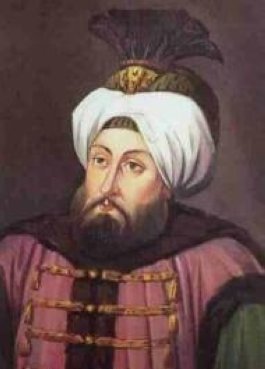
When Sultan Ahmed II was informed that he would ascend the throne, he recited the verse of the Quran which reads, "Allah, is the Lord of all dominion! He gives dominion to whom he wills, and exalts whom he wills." (Surah Ali 'Imran: 26). Then he said: " I did not aspire to this position. I didn't demand it. I didn't expect it either. Allah blessed it to this poor servant. I don't know how to be grateful for this blessing." Then, pointing his gray mustache out to those who pledged allegiance to him, he joked "Where have you been until now?"
First of all, he ordered the deputy grand vizier, who also acts as the minister of interior, to secure public order. Then he told the defterdar (head of the treasury) to watch out for spending. These actions showed that he would be closely involved in state affairs. As the treasury was in trouble due to war, soldiers could not be given coronation tip. At this time, the Grand Vizier Fazıl Mustafa Pasha was on the Austrian campaign. The sultan let him keep his position as the grand vizier.
The real loss
Fazıl Mustafa Pasha encountered the Austrian army of 100,000 in Serbia's Petrovaradin. Upon the enemy's retreat, he attacked without waiting for the Crimean cavalry to come to help, so as not to miss the opportunity. In the Battle of Slankamen, which took place on Aug. 25, 1691, the grand vizier dashed into the enemy lines with a bare sword to enthuse the soldiers. He was martyred by a bullet that hit him at that time.
Due to the imprudence of those around him, the martyrdom of the grand vizier spread by word of mouth. The sipahis (Ottoman cavalry) panicked and withdrew. The enemy understood the situation and this turned the war which was about to end in victory, into a defeat. However, the Austrians, who lost 40,000 men, were also deprived of the strength to fight. Taking advantage of this, the viziers withdrew the army. The enemy's failure to pursue the Ottoman army prevented the catastrophe from escalating. The real loss to the empire was the grand vizier.
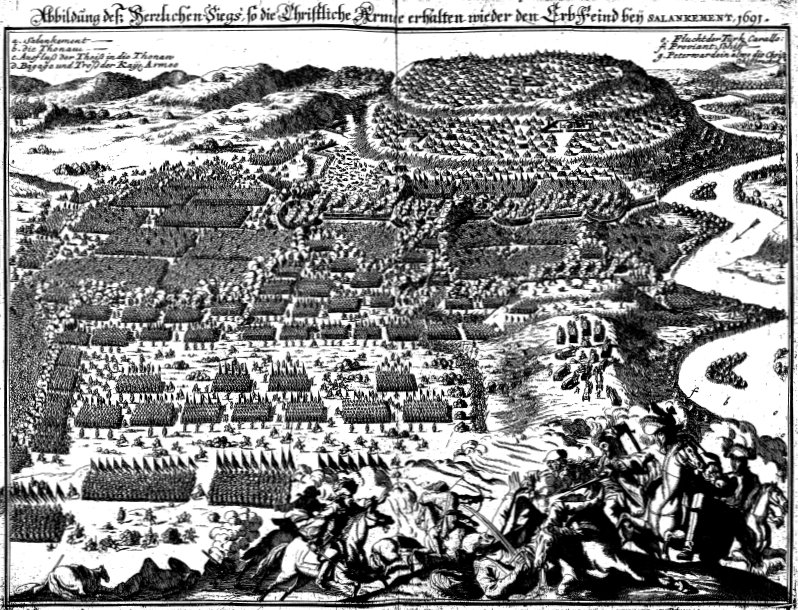
The news of the defeat and the martyrdom of the grand vizier was delivered to Istanbul. Upon this, Sultan Ahmed II scolded the Crimean Khan for his delay and exiled him to Rhodes with a letter he wrote. Those who played a role in the defeat were either executed or exiled. Meanwhile, a victory was achieved on the Polish and Transylvanian fronts.
The new Grand Vizier Bozoklu Mustafa Pasha set out for a campaign on the last day of June, 1692. The aim was to get Transylvania back. The besieged Belgrade was liberated. The withdrawal of the Austrians, who were also fighting against the French, gave the Ottomans a sigh of relief.
In August, 1692, the Venetians, together with the Papal and Florentine troops, landed on Crete. They besieged Chania. There were 1,500 soldiers in the fortress. During the war, the admiral of Malta was killed with 200 of his musketeers. When 8,000 reinforcements arrived from Heraklion, the Venetians lifted the siege and fled. The 41-day siege of Chania cost them 4,000 soldiers.
No worth in taking Hungary!
While the Grand Vizier Sürmeli Ali Pasha was on a campaign against Petrovaradin in 1694, a Venetian navy consisting of Maltese, Florentine and Papal fleets landed soldiers on the island of Chios. After two weeks of bombardment, Chios surrendered and Muslims were evacuated to Çeşme by ships. This news came as a bombshell in Istanbul. The fact that an island so close to the capital fell into the hands of the enemy made the sultan very sad. Those who played a role in the surrender of Chios were exiled.
In a letter he sent to the grand vizier in Belgrade, Sultan Ahmed II wrote: "Since Chios is in the hands of the enemy; even if you conquer all of Hungary, I don't desire it." The grand vizier immediately returned. He received another letter from the sultan in Edirne, and it read: "The situation of Chios tore my heart out. It is my intention to get it back. Talk to those whom you need to and let them know what needs to be done. If Chios is not obtained this winter, know that I will slay all the chiefs."
In the first days of 1695, the administration of the navy departing from Istanbul was given to Mezomorta Hüseyin Pasha. He was known as Mezomorta – a disfigured form of the Italian word Mezzomorto (Half-Dead) – because back in the day during a naval battle he had continued to fight although he was badly wounded, and later recovered.
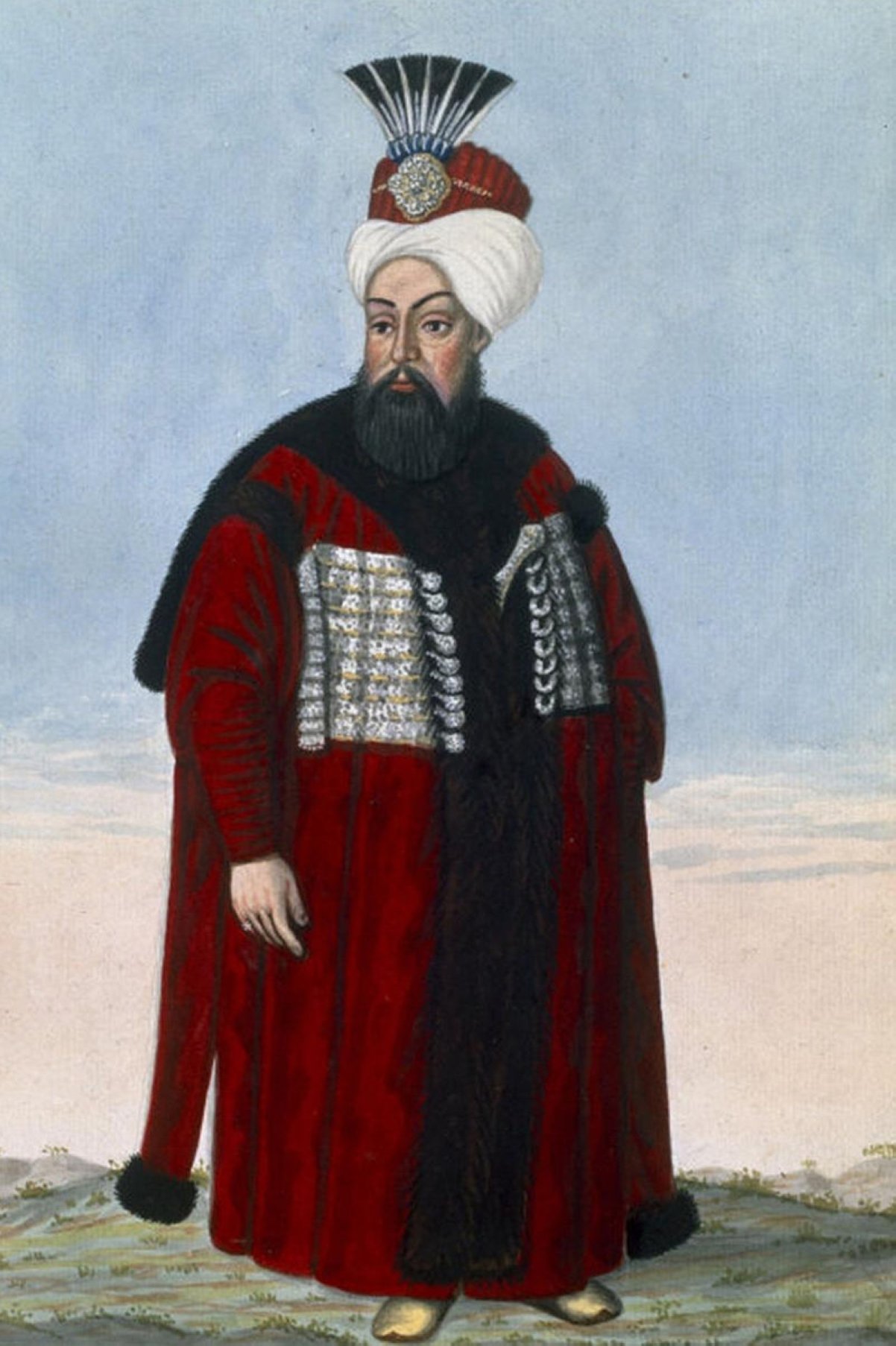
At noon on Feb. 9, 1695, they encountered an enemy fleet of 65 ships. The Ottoman navy had 48 ships. The Venetian commander, Benedetto, was killed by a cannonball. The enemy took refuge in the port of Chios. Mezomorta Hüseyin Pasha blocked the way and on Feb. 18, the enemy attacked. After a vicious naval battle, the enemy left Chios.
Before the good news reached Istanbul, Sultan Ahmed II, who got sick from the sadness of the loss of Chios, died on Feb. 6, 1695, in Edirne. He was 52 years old. Like his brother, he also suffered from hydropsy, which causes a buildup of fluid in the body’s tissue. By a strange coincidence, his reign, which lasted three years and seven months, was as long as his elder brother and predecessor, Sultan Suleiman II. He was brought to Istanbul and buried next to his elder brother in the tomb of his great grandfather Sultan Suleiman I, also known as Suleiman the Magnificent. In his stead, his nephew, Sultan Mustafa II ascended the throne.
He had children from his wife, Rabia Haseki, named Ibrahim, Selim, Hadice and Asiye; but they died at a young age. Only Selim's twin, Ibrahim, who died in 1714, survived till the age of 21. In 1703, some wanted to enthrone him, but heir Sultan Ahmed III's supporters were victorious.
Prince's diary
Sultan Ahmed II had a good command of the Arabic and Persian languages. He was interested in various kinds of sciences, and so he patronized scholars and artists. He had knowledge of poetry and music, and he especially favored reading famous Turkish and Persian poets regularly. He was a member of the Mevlevi order. He was a master calligrapher, as proven by the very beautiful mushafs (handwritten copies of the Quran) and books that he copied. The diary that he kept when he was a şehzade (prince) and which has survived to date is a good example of what a sense of responsibility and vision he had for the future.
He did not like to show off, he dressed simply according to historical sources. He would dress as a commoner and wander around, listening to people's troubles and giving advice where necessary. He would check if things were going well. He ordered the meetings of the Divan-ı Hümayun (Imperial Council) which had slackened by then, to be held four days a week like they once were, and he personally attended the meetings even when he was sick.
Grand Vizier Fazıl Mustafa Pasha described Sultan Ahmed II as "good-natured, pious, knowledgeable in every science, mature and magnanimous." He is described as very compassionate and patriotic. He lived as a just sultan and tried to do everything he could to please his nation.
The words he said when he ascended the throne show his sense of moral responsibility and service to his nation. He introduced a new method for collecting public revenues in Anatolia and Rumelia. Thus, he saved the people from the arbitrary actions of tax collectors and the treasury from losses.
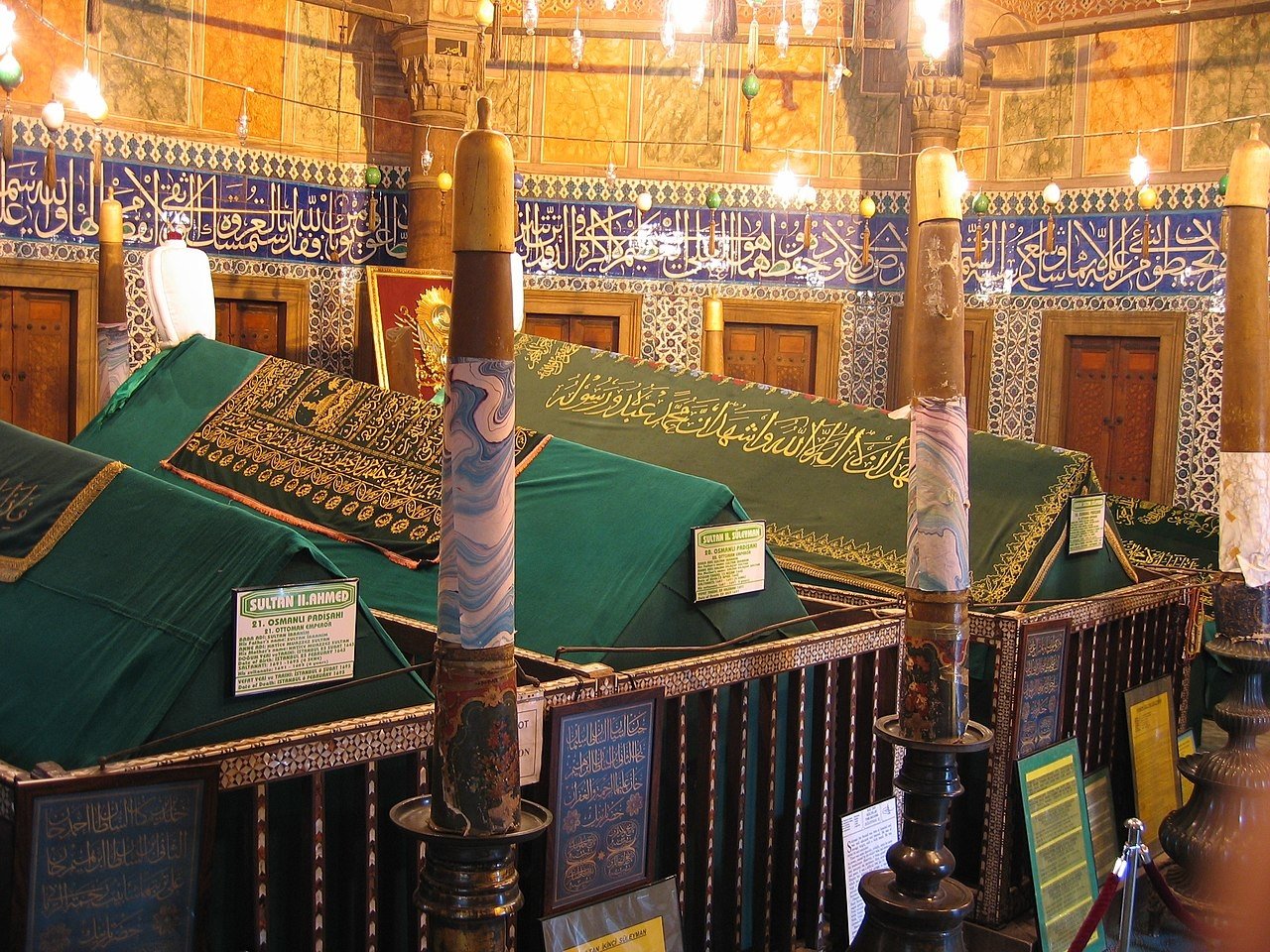
How can one not be angry
It is said that Sultan Ahmed II was short-tempered, but he pulled himself together quickly. He was respectful when someone spoke the truth. He would correct his mistake if he made any, and make up for it. He was good at recognizing the true nature of people. He recognized the virtuous bureaucrats and gave them duties but dismissed them for the slightest reason, as he wanted state affairs to function well. His great sense of service to the people and respect for the opinions of the nation played a role in these frequent appointments and dismissals.
Governor of Diyarbakır Çalık Ali Pasha, who was a highly qualified bureaucrat that grew up under the auspices of former Grand Vizier Merzifonlu Kara Mustafa Pasha, became a grand vizier in 1691. One particular conversation between Sultan Ahmed II and Çalık Ali Pasha the following year is commonly described in detail in the history books and is worth mentioning.
"I asked you to dismiss the head of treasure three times and appoint a pious and honest man in his place, but you did not listen," said the sultan. "What was his crime?" the pasha asked. "The people are complaining about him because of the injustices he has done," the sultan answered. "These are all baseless allegations. The head of treasure cannot do business on his own. Whatever he did, he did it on my orders," the pasha said, and resigned. Then Sultan Ahmed II became very angry and said, "I personally called the people and talked to them myself. They complained about the unfair taxes imposed on them. While I was looking for the cruel outside, it turned out that you were the cruel one. He who does not listen to my word cannot be my deputy. I'd deal with you; but everyone would blame me for bringing you from afar, making grand vizier, and then killing you."
Sultan Ahmed II wanted to make Bozoklu Mustafa Pasha, who possessed high merits like his predecessors, the grand vizier. When Bozoklu Mustafa Pasha did not accept, the sultan, who had become very angry that he was turning away from duty when the country was in a difficult situation, threatened him with death and made him accept the position.
The merciful and righteous Sultan Ahmed II called Çalık Ali Pasha and appeased him. "Let us appoint you the governor of whichever province you want," he said. The pasha did not want civil service; he wanted to retire and wanted the income of Mihaliç (today's Karacabey in Bursa) township to be paid to him as salary. When the new grand vizier said that this income was low, he said, "During war when the treasury is in a tight spot, even this is a lot. I'll be content with less," he said. After Bursa, he was sent to the Heraklion as a guard. He died there.
Önceki Yazılar
-
THE OTTOMAN DYNASTY AND QURAYSH9.07.2025
-
"WOE TO THE ENEMIES OF THE REVOLUTION!" What Was The People’s Reaction To The Kemalist Revolutions?2.07.2025
-
DEATH IS CERTAIN, INHERITANCE IS LAWFUL!25.06.2025
-
THE SECRET OF THE OTTOMAN COAT OF ARMS18.06.2025
-
OMAR KHAYYAM: A POET OF WINE OR THE PRIDE OF SCIENCE?11.06.2025
-
CRYPTO JEWS IN TURKEY4.06.2025
-
A FALSE MESSIAH IN ANATOLIA28.05.2025
-
WAS SHAH ISMAIL A TURK?21.05.2025
-
THE COMMON PASSWORD OF MUSLIMS14.05.2025
-
WERE THE OTTOMANS ILLITERATE?7.05.2025